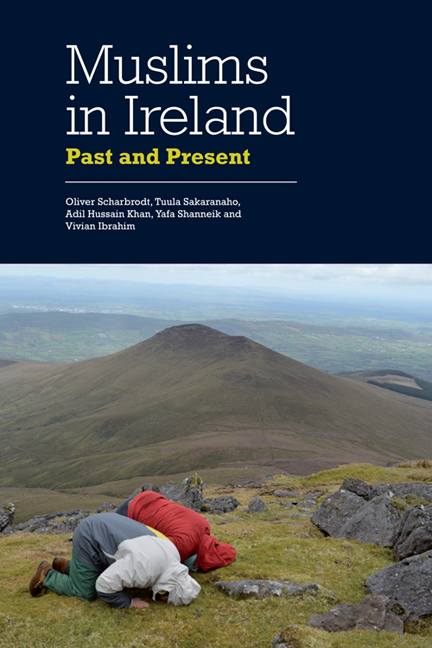Book contents
- Frontmatter
- Contents
- Figures
- Acknowledgements
- Introduction
- I History of Muslim Presence and Immigration to Ireland
- II Mosques, Organisations and Leadership
- III The Governance of Islam in the Republic of Ireland: Freedom of Religion and Islamic Education
- IV Diaspora and Identity
- Conclusion: Being Irish, Being Muslim
- Bibliography
- Index
Introduction
Published online by Cambridge University Press: 05 August 2016
- Frontmatter
- Contents
- Figures
- Acknowledgements
- Introduction
- I History of Muslim Presence and Immigration to Ireland
- II Mosques, Organisations and Leadership
- III The Governance of Islam in the Republic of Ireland: Freedom of Religion and Islamic Education
- IV Diaspora and Identity
- Conclusion: Being Irish, Being Muslim
- Bibliography
- Index
Summary
Mapping Islam in Ireland
In mapping of the growing Muslim population across Europe, Ireland has until recently been a blank spot. With the exception of a few contributions, little research has been undertaken on Muslims in Ireland. While this has changed in the last four years with a number of articles, book chapters and a special journal edition being published by the present authors, a comprehensive study of Muslims in Ireland has not yet been produced. This book aims to fill this gap and provides the first complete survey of Muslims in Ireland combining historical, sociological and ethnographic research approaches.
Located on the geographical periphery of Europe, Ireland has always experienced a delayed arrival of socio-cultural developments that shaped other Western European societies. Traditionally a country of emigration with a large global diaspora, it turned into a country of immigration in the mid-1990s with the beginning of the so-called Celtic Tiger, Ireland's years of massive economic development from 1995 until 2008. During the Celtic Tiger years, Ireland underwent significant social, cultural and economic transformations, one of which has been the ethnic, cultural and religious diversification of Irish society. While the net migration rate was negative until the mid-1990s, Ireland experienced a major influx of immigrants who made up the shortage of labour or arrived as refugees and asylum seekers. The rapid growth of Ireland's Muslim population is a direct consequence of the reversal of migration patterns. While there were around 4,000 Muslims in Ireland according to the 1991 Census, the number rose to almost 50,000 in the last 2011 Census, meaning that within twenty years there has been a more than tenfold increase of the Muslim population, which now makes up 1.1 per cent of the entire population of the Republic of Ireland.
One of the reasons for the relative scarcity of research on Muslims in Ireland is the very recent growth of the country's Muslim population. Most other Western European countries which received the bulk of labour immigrants, arriving from Muslim-majority countries after World War II, have now quite well-established Muslim presences, with second, third and fourth generations residing in them and with historical ties that date back to the colonial period and even further.
- Type
- Chapter
- Information
- Muslims in IrelandPast and Present, pp. 1 - 24Publisher: Edinburgh University PressPrint publication year: 2015



